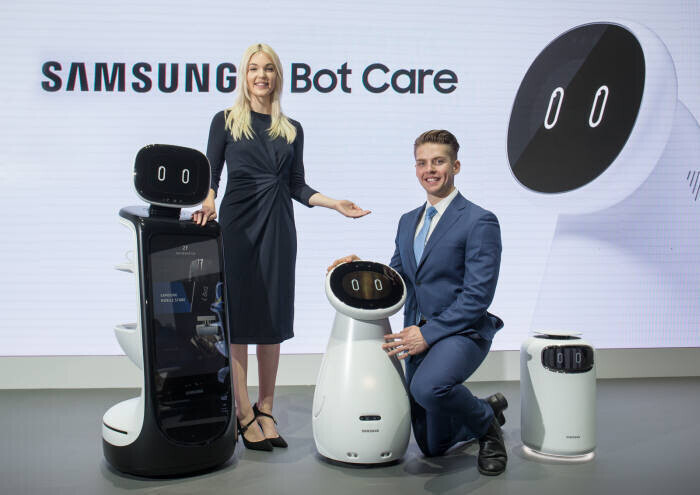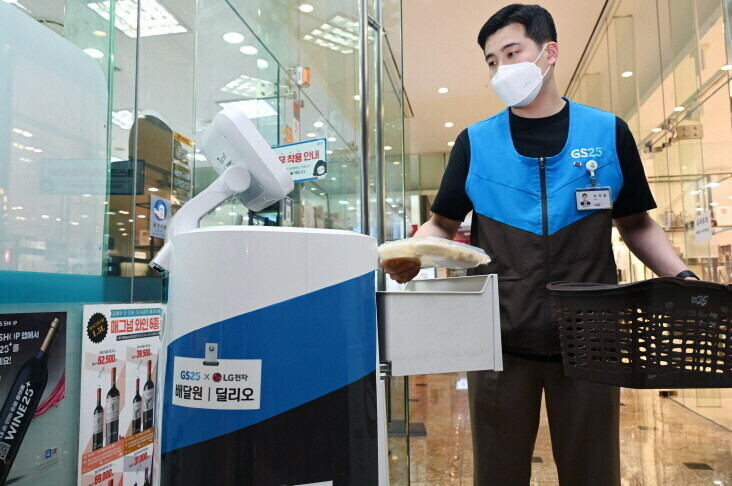hankyoreh
Links to other country sites 다른 나라 사이트 링크
Is a battle of the service robots brewing between Samsung and LG?

Samsung Electronics recently upgraded its robotics business task force — newly created under the director of its consumer electronics sector last February — into a permanent robotics business team.
It’s another example of a South Korean company moving to beef up its robotics business, following in the footsteps of LG Electronics’ inclusion of its robotics business center under its business solutions headquarters late last year and Hyundai Motor’s completion of its acquisition of the US robotics manufacturing company Boston Dynamics last June.
Why are companies picking up the pace on their robotics businesses?
According to accounts Monday from business world sources, Samsung Electronics’ reshuffle on Friday signaled plans to commercialize the company’s robots.
Between 2019 and early 2021, the company arrived at every CES trade show event with prototypes of the personal service robots it has been developing. These included Samsung Bot Care, a specialized robot assistant for elder care; GEMS Hip, a wearable robot to assist with walking; and Samsung Bot Handy, which helps with housework.
“Robotics combines Samsung’s innovative hardware, and cutting-edge AI software, to create solutions that both care for you and help you along the way — whether you’re at home or outside of it,” said Sebastian Seung, president of Samsung Research, during a CES press conference in January 2021.
At the time, he announced plans to use an optimized blend of hardware and software to allow robots to serve as people’s companions.
LG Electronics was even quicker than Samsung to move into the lifestyle-integrated robotics market. The company first presented a home lawn-mowing robot and airport guide robot at the 2017 CES event. In 2018, its first year with Koo Kwang-mo as chairperson, the company acquired management rights for the industrial robot manufacturer Robostar, while investing in related companies such as Angel Robotics, ROBOTIS, and Bossa Nova Robotics.
The robotics sector has been mentioned as a future source of revenue to take the place of LG Electronics’ mobile communications sector, which closed down in July.
The company is currently working overtime to broaden its business-to-business (B2B) service robot area, which includes indoor robot delivery solutions for items ordered from GS25 convenience stores, along with “guide bots” that feature guide and docent capabilities. It’s also developing self-driving robots that sterilize indoor environments with ultraviolet lamps.

The reason South Korea’s chaebol conglomerates are moving so aggressively into the robotics market has to do with the steep growth curve there. Last year, the market research firm Strategy Analytics estimated the scale of the global service robot market at US$31 billion as of 2020, with predictions that it would nearly quadruple in size to US$122 billion over the four years through 2024.
The market for industrial robots — used for manufacturing process automation and other purposes — is already saturated, with global businesses like Japan’s FANUC and Yaskawa Electric Corp. and Germany’s KUKA accounting for more than half of its share. But the service robot market is still in its early stages, which has prompted major businesses to take the plunge.
“There aren’t any key players yet driving the market for personal service robots outside the medical field, and that’s why South Korean corporations appear to be actively investing to gain a market advance,” said Park Sang-soo, director of the machinery and defense industry division at the Korea Institute for Industrial Economics and Trade, in a telephone interview with the Hankyoreh.
The reports that Samsung Electronics was diving into robotics in earnest fed strong performances by related stocks on the KOSDAQ index Monday.
Yujin Robot finished the day at 4,150 won per share, reaching the price limit (29.89%) in gains compared with the previous trading day. Also enjoying big boosts were ROBOTIS (29.73%), Hyulim Robot (25.71%), Robostar (15.46%), T-Robotics (8.36%), and Roborobo (7.47%).
By Sun Dam-eun, staff reporter
Please direct questions or comments to [english@hani.co.kr]

Editorial・opinion
![[Column] Welcome to the president’s pity party [Column] Welcome to the president’s pity party](https://flexible.img.hani.co.kr/flexible/normal/500/300/imgdb/original/2024/0515/3917157400447943.jpg) [Column] Welcome to the president’s pity party
[Column] Welcome to the president’s pity party![[Editorial] Korea must respond firmly to Japan’s attempt to usurp Line [Editorial] Korea must respond firmly to Japan’s attempt to usurp Line](https://flexible.img.hani.co.kr/flexible/normal/500/300/imgdb/original/2024/0514/2317156736305813.jpg) [Editorial] Korea must respond firmly to Japan’s attempt to usurp Line
[Editorial] Korea must respond firmly to Japan’s attempt to usurp Line- [Editorial] Transfers of prosecutors investigating Korea’s first lady send chilling message
- [Column] Will Seoul’s ties with Moscow really recover on their own?
- [Column] Samsung’s ‘lost decade’ and Lee Jae-yong’s mismatched chopsticks
- [Correspondent’s column] The real reason the US is worried about Chinese ‘overcapacity’
- [Editorial] Yoon’s gesture at communication only highlights his reluctance to change
- [Editorial] Perilous stakes of Trump’s rhetoric around US troop pullout from Korea
- [Guest essay] Preventing Korean Peninsula from becoming front line of new cold war
- [Column] The state is back — but is it in business?
Most viewed articles
- 1[Column] Welcome to the president’s pity party
- 2Could Korea’s Naver lose control of Line to Japan?
- 3[Editorial] Transfers of prosecutors investigating Korea’s first lady send chilling message
- 4[Editorial] Korea must respond firmly to Japan’s attempt to usurp Line
- 5Naver’s union calls for action from government over possible Japanese buyout of Line
- 6Major personnel shuffle reassigns prosecutors leading investigations into Korea’s first lady
- 7US has always pulled troops from Korea unilaterally — is Yoon prepared for it to happen again?
- 8[Column] Will Seoul’s ties with Moscow really recover on their own?
- 9[Correspondent’s column] The real reason the US is worried about Chinese ‘overcapacity’
- 10[Column] Samsung’s ‘lost decade’ and Lee Jae-yong’s mismatched chopsticks